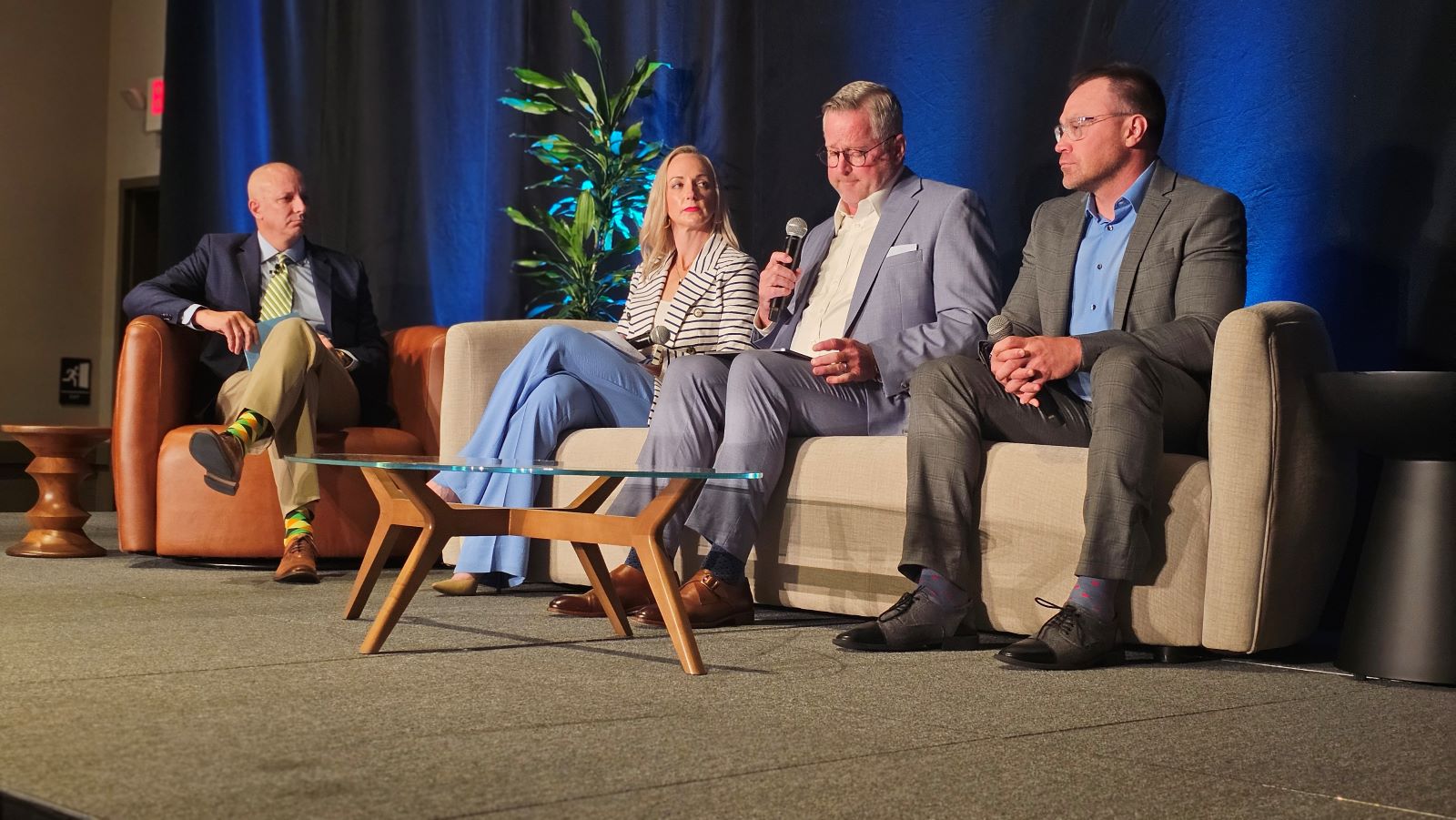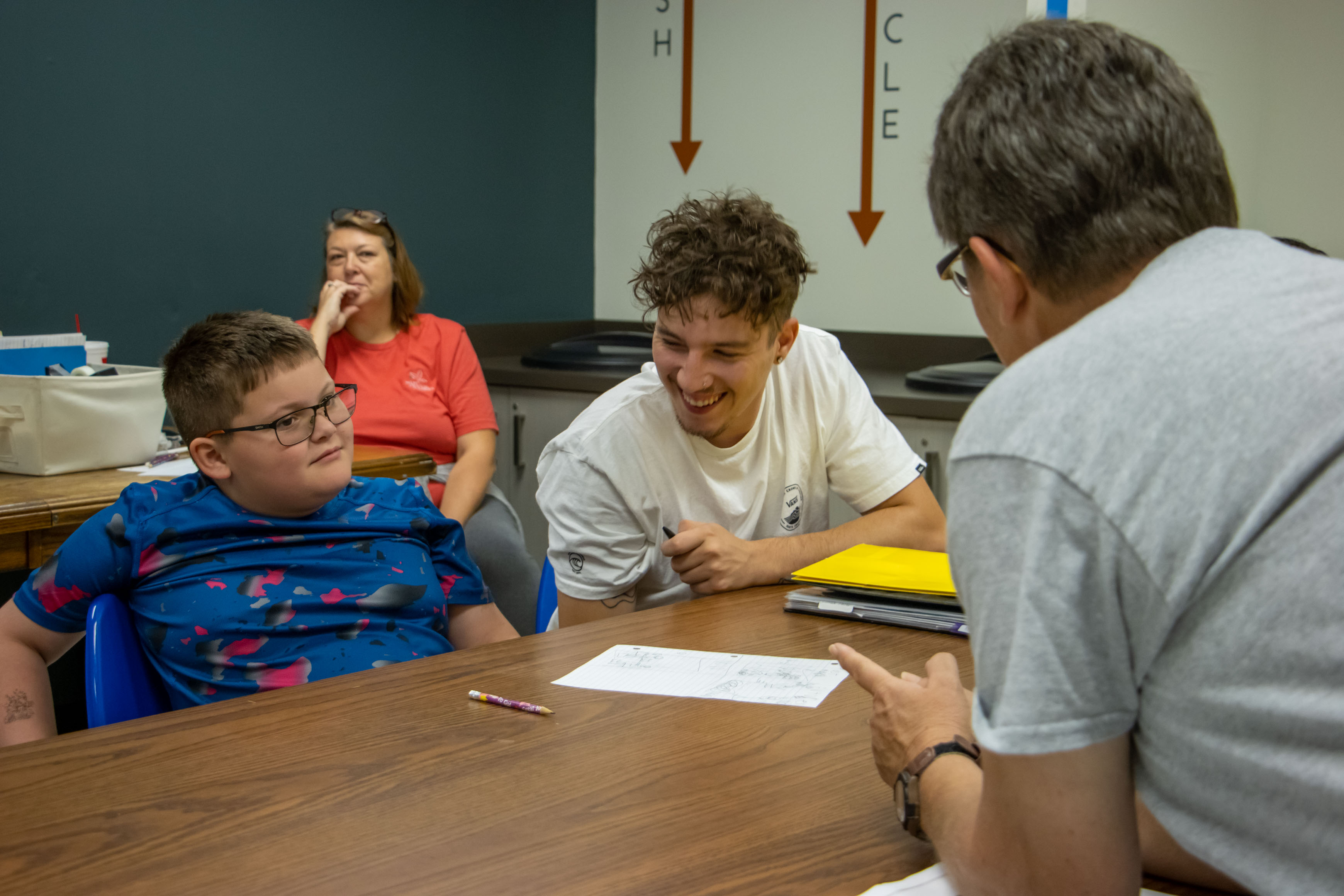One message was made clear at Springfield Business Development Corporation's 2024 Health Care Outlook: The Springfield metro is undergoing a mental health crisis that the community needs to urgently understand and address.
The Ozarks has a 20% higher suicide rate than Missouri as a whole, Clay Goddard, president of southwest region at Burrell Behavioral Health, said during the panel discussion at the Health Care Outlook. The region has a 60% higher suicide rate than the national average.
The panel consisted of representatives from the behavioral health companies that are trying to treat the growing mental health issues in the Springfield metro area, including Brightli Behavioral Health (parent company of Burrell), the Springfield-Greene County Health Department, AIDS Project of the Ozarks (APO) and the Arc of the Ozarks.
Who to call?
If you or someone you know is struggling, reach out to the National Suicide Prevention Lifeline by dialing or texting 988. Burrell Behavioral Health’s 24-hour crisis line is available at 1-800-494-7355.
The suicide rate in the Springfield metro increased 30% from 2019 to 2022, Katie Towns, director of public health at the Health Department, said at the event, which was held at DoubleTree by Hilton Hotel Springfield. Mental health and substance abuse have been identified as the No. 1 and No. 2 health priorities to address for Springfield, as the coronavirus pandemic exacerbated existing issues.
“These issues didn't get better during the pandemic,” Towns said during the panel discussion at the Health Outlook, which had more than 250 people in attendance. “The pandemic kind of opened and shined a lot of light on the mental health challenges that are gripping our community.”
‘Hey man, you good?'

The Springfield-Greene County Health Department recently launched an advertising campaign targeting males in the Ozarks, who are statistically more likely to commit suicide than their female counterparts, Towns said. The campaign, titled ‘Hey man, you good?' was launched with the Community Partnership of the Ozarks (CPO) and was funded by the Community Foundation of the Ozarks (CFO).
“Here in our community, unfortunately, men are disproportionately more affected by suicide in our community than females,” Towns said.
Men aged 45 and older are the most high-risk for suicide in Springfield, Towns said. Behind the campaign is a full-fledged plan to engage that age group of men in conversations regarding suicide, depression and suicidal ideation.
“We learned, specifically, about what things we needed to say and how we needed to phrase the conversation, because that matters in this space,” Towns said.
As part of the organization's Be Well Community initiative, Burrell is sending representatives to Springfield employers to discuss mental health and suicide with workers, Goddard said. The goal of those talks is to prevent a tragedy in the workplace.
“I've lost a coworker to suicide and I know how heartbreaking that is,” Goddard said.
Autism Center to address growing needs in Springfield

Besides suicide, other mental health issues are on the rise in Springfield. The national prevalence rate for autism by age 8 is 1 in 36, said Tim Dygon, executive vice president at the Arc of the Ozarks. That marks a 317% increase in autism diagnoses since the start of the millennium.
The Arc of the Ozarks opened a first-of-its-kind autism clinic in Springfield in January 2024. The new center aims to do about 500 autism assessments per year, as well as provide an array of services for individuals diagnosed with autism and their families, Dygon said. Services include family therapy, counseling, occupational therapy, speech therapy and other treatment.

The clinic serves people from early childhood through adulthood and has programs specifically designed for parents of children diagnosed with autism.
“It can be very taxing on not only the person diagnosed, but also the family,” Dygon said. “The divorce rate for individuals that have a kid with a disability is north of 80%. The divorce rate for individuals who have a kid on the (autism) spectrum is 86%.”

The needs are going to keep growing as mental health professionals learn more about autism and how to diagnose it. Through 2029, there will be 40,000 children in Missouri diagnosed with autism, Dygon said. The center aims to increase its assessment capacity to 1,000 per year.
“I can tell you right now there's not enough diagnostic capacity for that as well as support,” Dygon said. “We're going to have to find ways to support people on the (autism) spectrum.”
The center just began offering a new therapy, called Magnetic Resonance Therapy (MeRT). The therapy machine in the center is the first of its kind for autism treatment in Missouri, Dygon said. MeRT is a highly customized use of Transcranial Magnet Stimulation (TMS) and is a treatment for a range of neurological conditions.
“Basically, what it does is it kind of disrupts old pathways to create new pathways,” Dygon said.
The treatment, cleared but not approved by the Federal Drug Administration, lasts 6 to 8 weeks and consists of 36 sessions. Lasting about 30 minutes, a session happens five times a week. 68% of children with autism who underwent MeRT treatment had better vocal skills and language skills, Dygon said.
“Now, it does not cure autism,” Dygon said. “I want that to be clear. Again, it can significantly help.”
Silence is the enemy of solid mental health

If there's one take away from the Health Care Outlook that Towns wanted to implant on attendees, it's that the more we can openly talk about these issues, the more the mental health of the Springfield community will improve.
“So many people suffer in silence,” Towns said. “The more that silence is that permeating factor, the more that we are going to continue to have this impact of depression, anxiety and finally, suicide.”
The Health Department looks at the suicide rate as a gauge for the overall mental health of the Springfield community, Towns said.
“If we can get that number to start bending and going the other way, we're going to also be affecting the mental health improvement of the entire community as well,” Towns said.
Goddard said he hoped the future would bring the resolution of some of these issues in Springfield.
“Really for me, what I would like to see as an outcome, is that in five years we're not having this conversation,” Goddard said. “That this is something that were addressing effectively as a community.”
“This is a community issue. It's going to require community solutions.”

